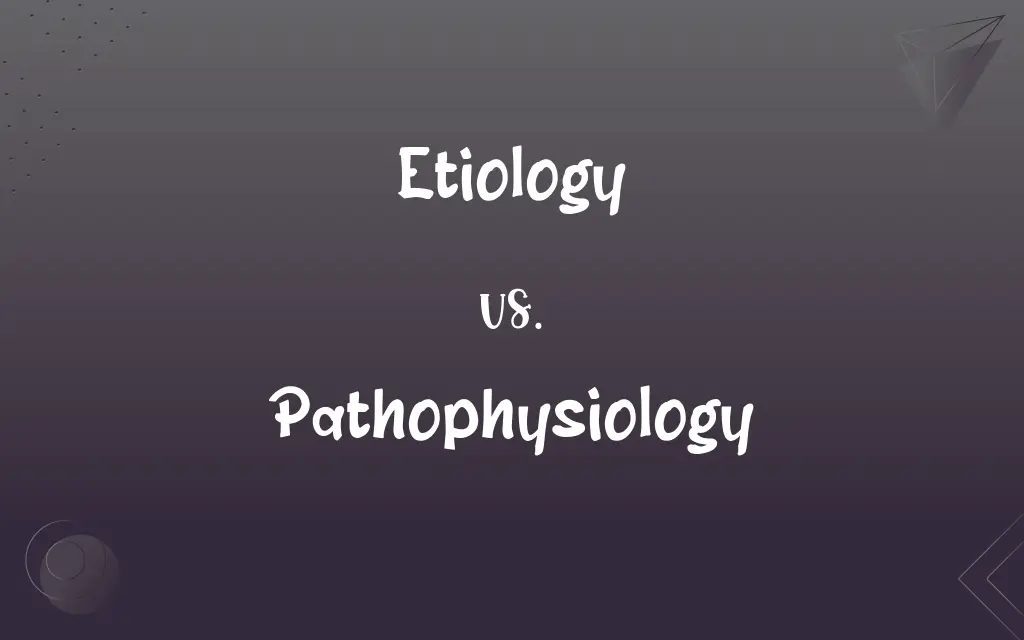Etiology vs. Pathophysiology: What's the Difference?
Edited by Harlon Moss || By Janet White || Published on February 8, 2024
Etiology is the study of the cause or origin of a disease, while pathophysiology is the study of how the disease progresses and affects the body.

Key Differences
Etiology focuses on identifying the factors leading to the onset of a disease, such as genetic, environmental, or infectious agents. Pathophysiology, on the other hand, examines the functional changes that occur within the body as a result of the disease.
In etiology, the investigation is centered around why a disease develops in the first place. Pathophysiology looks at the mechanisms through which the disease manifests and progresses within the body.
The etiology of a disease might include factors like lifestyle, hereditary conditions, or exposure to toxins. Pathophysiology describes how these factors lead to specific symptoms and clinical manifestations of the disease.
Understanding etiology is crucial for prevention and early detection of diseases. Understanding pathophysiology is essential for developing treatment strategies and managing disease progression.
Etiology often involves epidemiological studies to trace the origins and causes of diseases. Pathophysiology requires a detailed understanding of biology and physiology to explain how normal processes are altered by disease.
ADVERTISEMENT
Comparison Chart
Definition
Study of the cause or origin of a disease
Study of the functional changes caused by disease
Focus
Causes and risk factors of diseases
Mechanisms and progression of diseases
Purpose
To identify why a disease occurs
To understand how a disease affects the body
Key Areas
Lifestyle, genetics, environment
Biological and physiological alterations
Application
Prevention, early detection
Treatment, management of disease progression
ADVERTISEMENT
Etiology and Pathophysiology Definitions
Etiology
Etiology refers to the study of disease origins.
Researchers are studying the etiology of Alzheimer's disease.
Pathophysiology
Pathophysiology refers to how diseases alter bodily functions.
Understanding the pathophysiology of cancer is key to developing treatments.
Etiology
Etiology is the investigation into the cause of a disease.
The etiology of lung cancer often points to smoking as a primary cause.
Pathophysiology
Pathophysiology is the study of changes in the body due to disease.
The pathophysiology of arthritis involves joint inflammation and damage.
Etiology
Etiology involves identifying factors leading to illness.
The etiology of diabetes includes both genetic and lifestyle factors.
Pathophysiology
Pathophysiology involves studying the progression of diseases.
Researchers examine the pathophysiology of COVID-19 to understand its effects.
Etiology
Etiology is the analysis of why a disease develops.
Understanding the etiology of heart disease helps in prevention.
Pathophysiology
Pathophysiology is about the physical and biochemical changes due to illness.
The pathophysiology of diabetes involves insulin resistance and pancreatic dysfunction.
Etiology
Etiology encompasses the causes behind health conditions.
The etiology of asthma is often linked to environmental allergens.
Pathophysiology
Pathophysiology is the examination of disease processes.
The pathophysiology of hypertension includes changes in blood vessel function.
Etiology
The study of causes or origins.
Pathophysiology
The functional changes associated with or resulting from disease or injury.
Etiology
The branch of medicine that deals with the causes or origins of disease.
Pathophysiology
The scientific study of such changes. In both senses also called physiopathology.
Etiology
Assignment of a cause, an origin, or a reason for something.
Pathophysiology
(pathology) The physiological processes associated with disease or injury.
Etiology
The cause or origin of a disease or disorder as determined by medical diagnosis.
Etiology
Standard spelling of aetiology
Etiology
The science of causes. Same as tiology.
Etiology
The cause of a disease
Etiology
The philosophical study of causation
FAQs
What is pathophysiology?
Pathophysiology is the study of how diseases affect the body's functions.
Why is etiology important in medicine?
It helps in understanding the risk factors and prevention of diseases.
What does etiology mean?
Etiology is the study of the causes and origins of diseases.
What role does pathophysiology play in healthcare?
It aids in developing treatment strategies and understanding disease mechanisms.
Are infections considered in etiology studies?
Yes, infections are a key aspect of the etiology of many diseases.
How does etiology differ from pathophysiology?
Etiology focuses on causes, while pathophysiology focuses on the effects and progression of diseases.
How do lifestyle factors contribute to etiology?
Lifestyle choices like diet and exercise can significantly impact disease development.
Does pathophysiology include the study of symptoms?
Yes, it includes studying symptoms as part of understanding disease processes.
Does pathophysiology focus on organ systems?
Yes, it often focuses on how diseases affect specific organ systems.
What role do environmental factors play in etiology?
Environmental factors can significantly influence the development of certain diseases.
Can pathophysiology change over time?
Yes, as diseases progress, their pathophysiological processes can evolve.
How is etiology used in disease prevention?
By identifying causes, interventions can be designed to prevent disease onset.
How does pathophysiology relate to chronic diseases?
It examines the long-term effects and complications of chronic diseases.
Can etiology vary for the same disease?
Yes, different factors can contribute to the same disease in different individuals.
Can etiology include genetic factors?
Yes, genetics can be a significant part of a disease's etiology.
Is etiology always clear in diseases?
Not always; some diseases have complex or unknown etiologies.
How does pathophysiology inform drug development?
By understanding disease mechanisms, more effective drugs can be developed.
Does pathophysiology include cellular changes?
Yes, it encompasses cellular and molecular changes occurring in disease states.
Is genetic predisposition part of etiology?
Yes, genetic predisposition is a critical aspect of etiology for many diseases.
How does pathophysiology relate to diagnostics?
It helps in understanding the underlying causes of symptoms for accurate diagnosis.
About Author
Written by
Janet WhiteJanet White has been an esteemed writer and blogger for Difference Wiki. Holding a Master's degree in Science and Medical Journalism from the prestigious Boston University, she has consistently demonstrated her expertise and passion for her field. When she's not immersed in her work, Janet relishes her time exercising, delving into a good book, and cherishing moments with friends and family.
Edited by
Harlon MossHarlon is a seasoned quality moderator and accomplished content writer for Difference Wiki. An alumnus of the prestigious University of California, he earned his degree in Computer Science. Leveraging his academic background, Harlon brings a meticulous and informed perspective to his work, ensuring content accuracy and excellence.































































